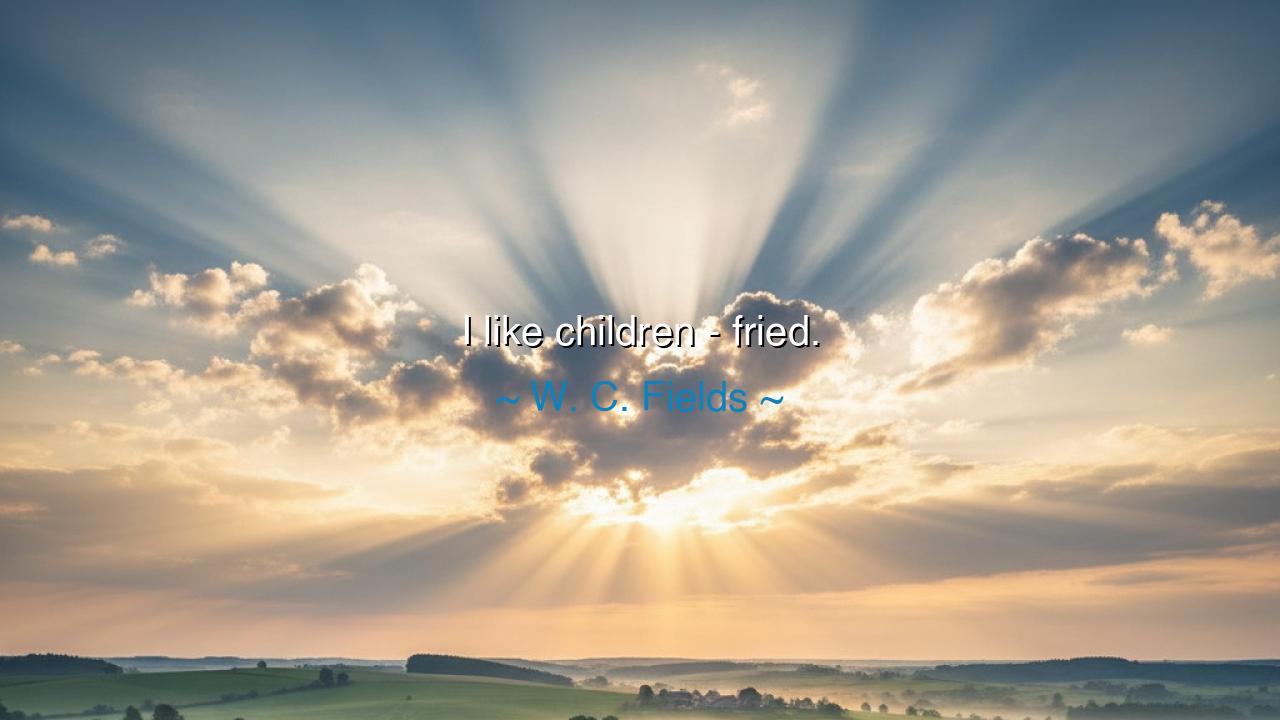
I like children - fried.






In the annals of humor, there are those whose words seem at first glance to strike with cruelty, yet beneath their sharp edges lies a profound, biting truth. W. C. Fields, a master of wit and satire, was one such figure, known for his irreverence, his disdain for the overly sentimental, and his ability to peel back the layers of human nature with the scalpel of humor. "I like children—fried," he once quipped, a phrase that, at first, seems jarring, even distasteful. Yet, in its audacity, it invites reflection on the nature of humor, society, and the ways in which we confront our own discomforts.
At the heart of Fields' quote lies a strange paradox: a statement so outrageous, so exaggerated, that it forces us to confront our assumptions and expectations. In the ancient traditions, humor was often used as a tool of subversion, a way to shake the foundations of accepted norms and expose the hypocrisies of the powerful. Fields, like the jesters of old, wielded his words like a weapon, aiming not to cause harm, but to provoke thought and reflection. To say one "likes children fried" is to turn the world upside down, to present a world so absurd that it forces us to laugh, if only to cover the discomfort it creates.
But beneath this comic absurdity lies a deeper lesson about the nature of human relationships and societal expectations. In the same way that the fool of ancient courts would speak truths veiled in jest, Fields' words point to the tension that exists between societal expectations and the harsh realities of life. Children, with their innocence and vulnerability, are often seen as sacred in the eyes of society, yet Fields' humor reminds us of the tension that exists between our idealized notions of childhood and the often difficult realities of parenthood.
This idea is not new, for in the histories of old, we find countless examples of how the youthful ideal was often at odds with the darker, more cynical reality of life. Take, for example, the Roman poet Juvenal, whose satirical writings often painted a grim picture of the human condition. In his works, he mocked the hypocrisy and excesses of Roman society, not sparing even the most sacred institutions, like marriage or child-rearing. His biting commentary, though cruel at times, was a reflection of his belief that society’s ideals were often in conflict with its practices, and that humor was the only way to reveal these contradictions.
W. C. Fields, too, reveals the contradiction within us all—the deep, unspoken tensions between what we claim to value and what we truly experience. His remark on children—though hyperbolic and grotesque—is an invitation to confront the absurdities that lie just beneath the surface of our everyday lives. It speaks to the frustrations of adulthood, the weariness of responsibility, and the ever-present tension between societal expectations and personal discomfort. In many ways, Fields' humor is a deflection, a way to express through absurdity what cannot be directly stated.
But let us not be deceived into thinking that Fields’ quote is simply an expression of bitterness or cynicism. Like the heroes and sages of old, whose wisdom often came through paradox and riddle, Fields' words invite us to ask: What does it mean to care for others? Is it not true that at times, the burden of care—be it for children, the elderly, or any of the vulnerable—feels overwhelming? And is it not in these moments of frustration, when we feel burdened by expectations, that humor becomes our shield and our release?
The lesson we draw from this is not to dismiss Fields' words as mere cruelty, but rather to recognize the power of humor to reveal our hidden truths. We must learn to laugh at life’s contradictions, to embrace the discomfort and absurdity that exists in our everyday experiences. In doing so, we free ourselves from the weight of societal expectations and reclaim the power of our own voices. Humor, in its most biting form, can be both a weapon and a tool of liberation, allowing us to confront the harshest realities with a smile, and in that smile, find the strength to endure.
And so, let us take from W. C. Fields’ words not only their shock value, but their deeper meaning. To face life’s challenges, to embrace the absurdity of the human condition, and to find humor in even the darkest corners of existence, is to live with both awareness and resilience. For the wise know that the laughter of the fool is often the most honest expression of truth. And through that laughter, we are reminded that to be human is to live in paradox—and in that paradox, we find our strength.






AAdministratorAdministrator
Welcome, honored guests. Please leave a comment, we will respond soon